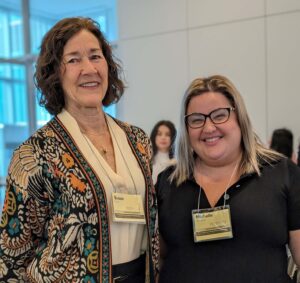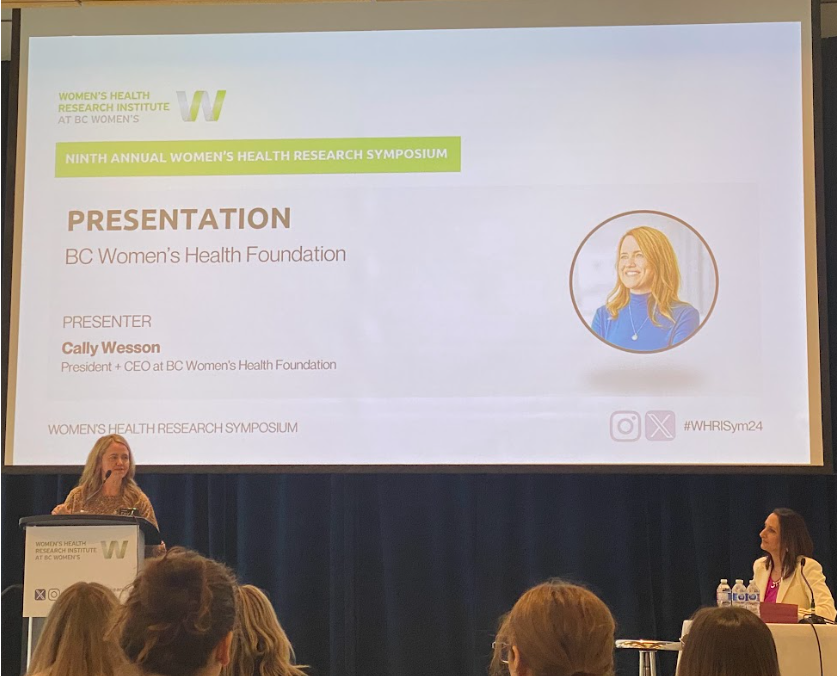
Celebrating the Evidence and Opportunities for Mid-Life and Menopause
On Friday March 8th, 2024, International Women’s Day, the women’s health research community in BC came together for the Ninth Annual WHRI Symposium. With over 180 in person and 129 online, this marked one of the most well-attended symposia to date with 309 attendees. WHRI Executive Director, Dr. Lori Brotto, welcomed attendees and was joined by Elder Sheila Nyman, who opened the event.
Dr. Jerilynn Prior grounded the audience with a conversation and tool about language, emphasizing the importance that clinicians, researchers, patients, and trainees are using a common language when discussing menopause. The official definition of menopause is “the final life phase (for a person born with ovaries) that begins a year following the last menstrual flow”. This tool can be downloaded and used to facilitate accurate descriptions in your own work and research.
The History, the Opportunity, the Data
The symposium keynote was, Dr. Susan D. Reed, Professor Emeritus and past Vice Chair for Research in the Department of Obstetrics and Gynecology, with an adjunct appointment in Epidemiology at the University of Washington School of Medicine who is also the immediate past president of The Menopause Society. After presenting three historical studies, clarifying the safety considerations for menopausal hormone therapy, Dr. Reed left the audience with several key takeaways:
- To properly study menopause, diverse populations need to be included in research.
- Menopause education requires better integration, lacking clear pathways for evidenced based educational resources and tools, making menopause information more accessible and overall improve health care for women.
- Enhanced public education empowers informed decision making, that counters misleading menstrual and menopause disinformation, that promotes greater understanding of one’s health.
One tool she showcased, My Menoplan (Home – My Menoplan), can be used to understand what stage of menopause you are in, and provide foundational information about treatment options prior to speaking with a healthcare provider. Dr. Reed left us with a reminder, that “pregnancy is a choice; aging is not” so we need to invest in menopause.
Dr. Michelle Jacobson built on Dr. Reed’s talk with her spotlight presentation about the legacy of the Women’s Health Initiative (WHI) hormone therapy trial. She highlighted how the trial data and media portrayal impacted hormone therapy uptake, resulting in missed opportunities for people experiencing menopausal symptoms. By presenting the data in a sound way, and engaging in knowledge translation, she hopes to reduce the fears initially resulting from the premature discontinuation of the trial.
Dr. Jacobson clarified that the WHI trial showed:
- All-cause mortality was decreased;
- First time hormone therapy users showed no increased breast cancer or cardiovascular health risks;
- Estrogen-only users had a decreased risk of breast cancer.
Dr. Jacobson closed with a reminder, “our job is to provide information and allow people to make informed decision…about their menopause care…with their consent.”
rapid research take-aways
Dr. Natasha Prodan- Bhalla showcased research on how menopause is a risk factor for heart disease and key lessons learned from this work, from limited funding for research examining the manifestation of heart disease in women and the need for consistency in recording cardiac variables which would enable more accurate data collection.
Dr. Aline Talhouk emphasized the importance of endometrial cancer identification and linkage to the menopause transition. Endometrial cancer has a window of risk during midlife, and prevention using hormone therapy, aspirin, diabetic medication, and obesity drugs, can be effective.
Dr. Silke Cresswell-Appel discussed the connection between menopause, exercise, and brain health and how exercise is connected to better long term and increased cognitive function in midlife. She highlighted the BC Brain Wellness Program, offering lifestyle ad wellness initiatives for those living with chronic brain conditions.
Dr. Marina Adshade, presented how people who are navigating life’s transitions, such as menopause, experience a strong feeling of loneliness. In additional to psycho-social impacts, there are also economic ramifications. Loneliness affects one’s capacity to work and socialize, with the lack of supports given to women in mid-life to be empowered in the work force. Dr. Adshade shared that loneliness can have a domino effect that picks up over time. If not addressed, the associated health issues can increase. She closed with “it is important for us to understand these menopause symptoms, and take an approach to improve women’s health.”
Dr. Hélène Côté presented on menopause and healthy aging for women living with HIV, highlighting the links between HIV, homelessness, mortality, and cardiovascular risk.
Bhairavi Warke utilized a participatory approach to explore the lived experiences of women in perimenopause and menopause. Topics explored were centered around how women experience loss of productivity, and encounter feelings of anxiety, stress, lack of social support, and lower quality of life.
Celebrating Excellence
Dr. Brotto announced our newest award, Community Champion for Knowledge Mobilization, this year aligned with our theme, Midlife Women’s Health. The recipient, Shirley Weir, is no stranger to the WHRI, she has been the Emcee of our public events, the @WomensResearch Wellness Exchange. She is a three-time author, podcast host, TedX Speaker, women’s health advocate, has tweeted for Oprah and speaks regularly to media. In 2012, Shirley launched, a health education platform that empowers women to talk openly about perimenopause and menopause, navigate midlife health information and connect to professionals who can support their journey. One of her goals is to convince women we are not meant to suffer; we deserve to feel amazing. With an audience of over 300K, she moderates a very active private online community regarded as the “go-to” place for reliable, evidence-based women’s midlife health information. Thank you, Shirley!
Dr. Paul Yong presented the inaugural WHRI Graduate Student Achievement Awards. The Masters level recipient was Zeba Khan, and the PhD level recipient was Hallie Dau.

Zeba Khan is currently a PhD student in Women and Children’s Health Sciences (WACH) Program in the Department of Obstetrics and Gynaecology at the University of British Columbia and her research supervisor is Dr. Sarah Munro. Zeba’s research focuses on developing, evaluating, and implementing evidence-based, user-centred, digital knowledge mobilization tools that enhance sexual and reproductive health care, focusing on menstrual health, for underserved populations. Zeba previously completed her Master of Science in Developmental Sciences in the UBC Department of Obstetrics and Gynaecology.
Hallie Dau is currently a PhD student at the at the School of Population and Public Health at the University of British Columbia and her research supervisor is Dr. Gina Ogilvie. Hallie’s research focuses on the impact of cervical cancer on women and families in low- and middle-income countries. Hallie previously completed her MPH at the George Washington University where she focused on global maternal and child health.
Congratulations, Zeba and Hallie!
Investing in BC
BC Women’s Health Foundation CEO, Cally Wesson announced the launch of the Professorship in Midlife and Mature Women’s Health, a University of British Columbia and BC Women’s Hospital + Health Centre clinician-scientist position focused on mid-life and menopause health and research.

Thank You
Thank you to our event sponsors, PHSA, BCWHF, and BCWH!
To all our presenters, attendees, trainees, poster presenters and event organizers, thank you. We hope that everyone has seen the opportunity and importance of menopause research.
We welcome you to next year’s Women’s Health Research Symposium, which will occur on Friday March 7, 2025. Save-the-Date in your calendars and hope to see you there!
For additional coverage on the Ninth Annual Research Symposium, please visit the Women’s Health Research Cluster blog post here.